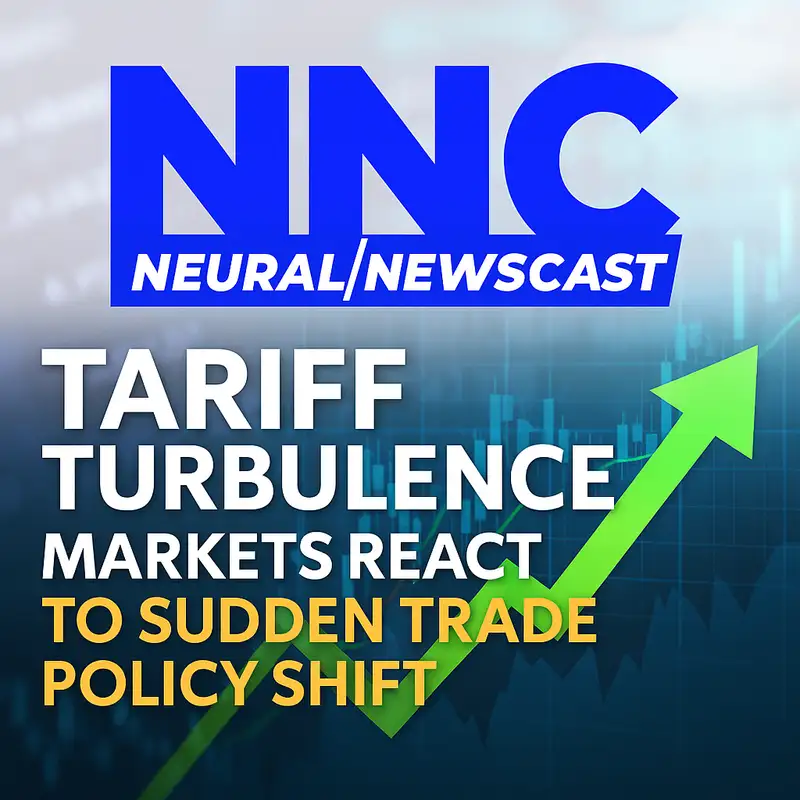Tariff Turbulence: Markets React to Sudden Trade Policy Shift
[00:00] Ethan Wells: Welcome to this special bonus episode of PLACEHOLDER 0 . I'm Ethan Wells, joined by world affairs correspondent Monica Kellan. Today, we re tracking the whirlwind developments in international trade policy and the rollercoaster ride it's sent financial markets on. It s been a week of unpredictable pivots and tonight s episode will break it all down. [00:20] Monica Kellan: Thanks, Ethan. What a week it s been. After a series of aggressive tariff increases that escalated tensions between major economies, we ve now seen an abrupt shift. A significant reduction in tariffs has just been announced backpedaling on some of the harshest measures we ve seen in recent trade disputes. The impact has been immediate. [00:41] Ethan Wells: That s right. Markets have responded with optimism at least temporarily. The dramatic easing of duties for dozens of global trading partners has calmed investor nerves and injected fresh energy into several key indexes. But the bounce comes with caveats. [00:56] Monica Kellan: Because while tariffs have been lowered for many nations, the policies targeting a key economic rival China have been ramped up. We re now seeing an uneven strategy take shape: encourage cooperation from allied nations, while maintaining pressure on competitors. [01:11] Ethan Wells: This tactic what some are calling a selective tariff freeze has had a complex ripple effect. On one hand, the relaxation of duties for many countries appears to be a move toward restoring trade stability. On the other, the escalation against China sends a clear signal that the trade dispute is far from resolved. [01:32] Monica Kellan: And globally, the response has been mixed. Some governments have welcomed the de-escalation as a gesture of diplomacy. Others are watching closely, wary of becoming collateral damage in a larger economic standoff. Some regions have begun quietly revising their own trade policies to avoid getting caught in the crossfire. [01:52] Ethan Wells: Meanwhile, back in the financial world, the stock market has been on a tear. Tech and manufacturing sectors in particular have rebounded after days of volatility. But it s not all rosy commodity markets remain tense, and agriculture-focused industries are still feeling the sting of uncertainty. [02:09] Monica Kellan: That uncertainty is also showing up in global supply chains. Even as duties are reduced for some partners, companies remain cautious. Many are reluctant to resume full operations until there's more clarity about where this strategy is heading. [02:24] Ethan Wells: And politically, we re seeing pressure on all sides. Critics are calling the policy reversals erratic, arguing that such dramatic shifts undermine confidence in long-term trade stability. Supporters, on the other hand, say it s a calculated move designed to reward cooperation and punish economic aggression. [02:42] Monica Kellan: Outside the U. S. , allies are weighing how to respond. Some may take the tariff pause as a window of opportunity to strike new bilateral trade agreements. Others may hedge, waiting to see if this change sticks or reverses again next week. [02:58] Ethan Wells: The fast pace of change this week makes it hard to find solid footing. Just a few days ago, investors were preparing for a prolonged economic standoff. Now, optimism has returned but many are asking: for how long? [03:13] Monica Kellan: And of course, all eyes remain on China. With new, higher tariffs still in place, their next move could determine whether this evolves into a full-scale decoupling or a slow return to negotiation. A response is expected soon and it could shake things up all over again. [03:32] Ethan Wells: In a world where global markets are more interconnected than ever, trade policy isn't just an economic tool it s a signal, a lever, and sometimes, a warning shot. This week proved that again in dramatic fashion. [03:46] Monica Kellan: We ll be watching closely. Stay with us for continued coverage as this story unfolds. For now, that wraps today s bonus episode. [03:54] Ethan Wells: Thanks for tuning in to PLACEHOLDER 0 . Subscribe for more updates and expert analysis on global finance, politics, and technology. Until next time stay sharp, stay informed.
Creators and Guests



